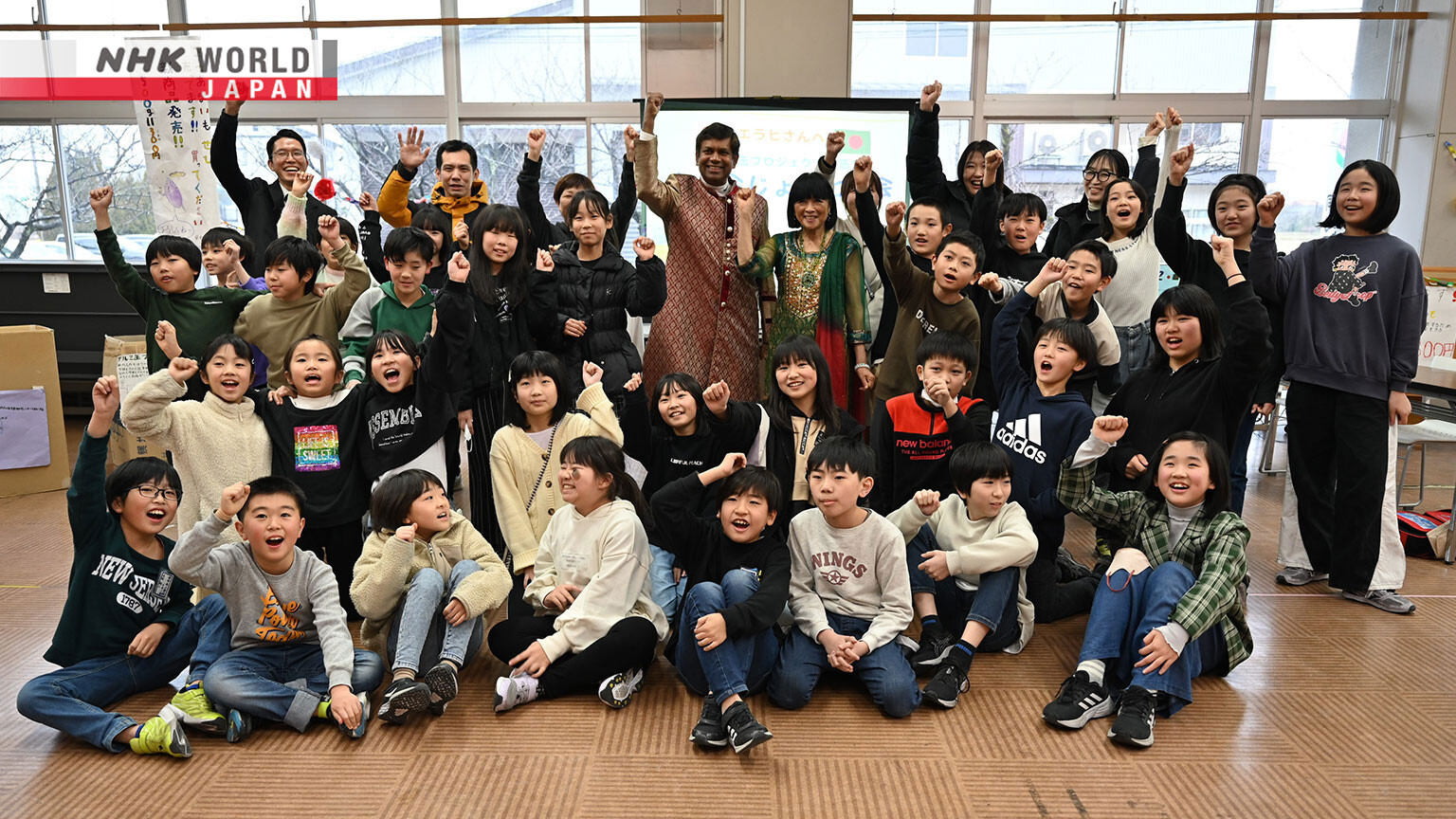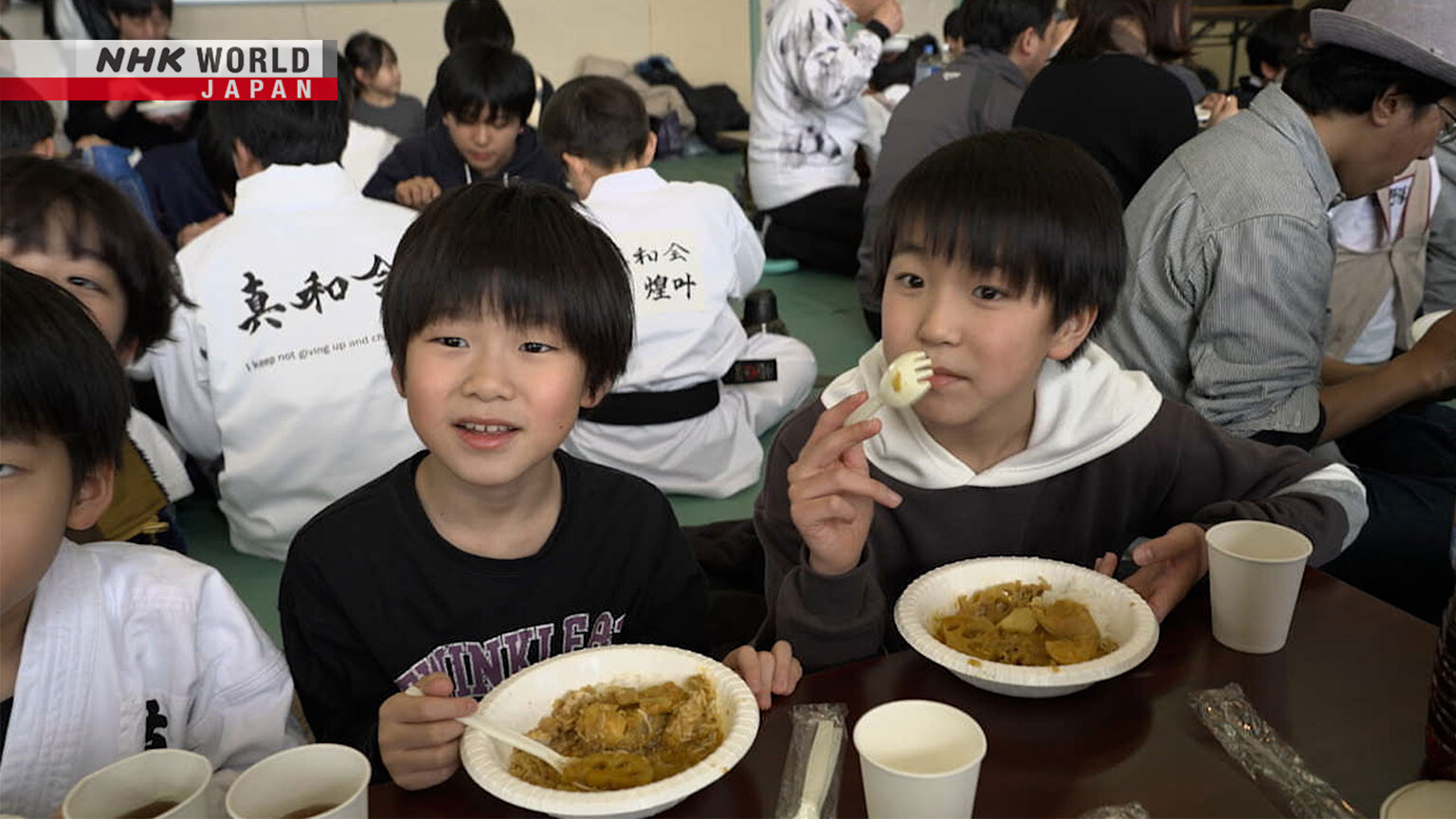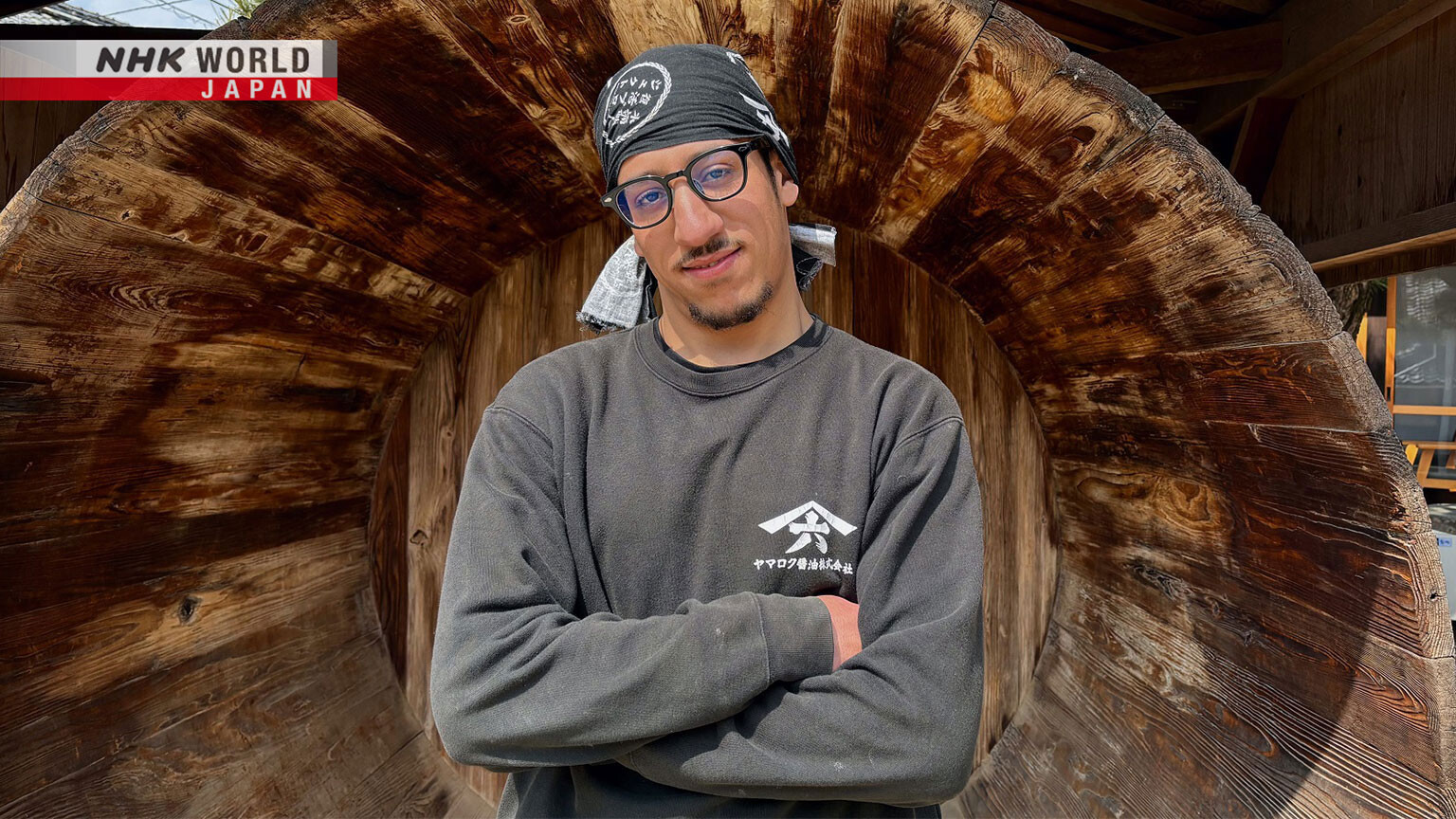A Well-Rooted Future for Children
We meet Muhammad Nurul Elahi in Niigata Prefecture who grows lotus roots to fund an elementary school he opened in his native Bangladesh, and Moroccan Mohamed Aalla who trains at a soy sauce maker in Kagawa Prefecture.




Transcript
Where We Call Home.
Growing lotus roots to help children in his native Bangladesh is this man.
Muhammad Nurul Elahi.
Thank you!
He founded a school for children in need, which he supports from his town of adoption in Japan.
The joy of helping people is my treasure.
To help finance his project, he grows and sells lotus roots, a local specialty.
Also an ingredient in Bangladeshi cuisine, Elahi uses them to create new flavors.
His surrounding community too is contributing to his efforts.
Even children!
Let's get a closer look at Elahi and his mission.
Let's grow lotus roots!
Mitsuke City in Niigata Prefecture.
It's a region known for its knitted apparel and agriculture industries, as well as for its snowy winters.
Working at this factory that makes die-manufactured parts is Muhammad Nurul Elahi from Bangladesh.
- Here are the parts!
- Thanks!
He came to Japan in 1989.
After learning die-manufacturing skills, he found his current job.
He's been working here for more than twenty years.
I'm so thankful for this company. That's why I've worked here so long!
Also fixing and maintaining machinery, he's one of the backbones of the factory.
Elahi sends most of the income he earns working here as operating funds for an elementary school in his native country.
He does so much we couldn't do. I have a lot of respect for him.
But he's recently been facing a major obstacle: the rapid fall of the Japanese yen.
To compensate for the loss in value, he decided to grow lotus roots, a local specialty,
and use the profits from their sale.
It's for the children in Bangladesh.
It's my one and only reason to do this.
Lotus roots are harvested between November and March,
a time during which Elahi works in the field from six o'clock every morning before heading to his regular job at the factory.
It's cold!
I got some!
These are lotus roots!
The day's harvest is cleaned up then packed before Elahi takes it to a local farmers' market.
Let's give them a discount. Set the price at ¥100.
Supporting him is his wife Misako.
I've rediscovered how delicious lotus roots could be!
The two met in 1991 during a poetry reading event at a local community center.
Misako, who worked as a nurse at the time, was drawn to Elahi's honesty.
The two hit it off and got married.
Two years ago, she joined the city council and has been working on healthcare reforms.
She finds time in her busy schedule to give her husband a hand in his support of children in Bangladesh.
The project was in fact Misako's idea.
It happened when the two visited Elahi's father's home village after they got married.
She was shocked when she realized poverty was such that there was no school for children to attend.
I asked them about their dreams.
They said they wanted to be doctors or teachers when they grew up.
"But there's no school," I thought.
It was Misako who said, "We should open a school."
We wanted to do something to help the people of the village.
Most of the children were illiterate. We wanted to change that.
That's how we felt.
And so, in 2011, they began to raise funds in Niigata to build the new school.
Five years later, they'd gathered the equivalent of around fifty-five thousand US dollars.
In January 2017, the school finally opened.
Eager to learn, some two hundred children from in and out of the village filled the classrooms.
And, looking to potential cultural exchange programs, some Japanese language lessons too are held.
1, 2, 3, 4...5.
To Mr. and Mrs. Elahi, thank you so much!
Elahi's lotus roots currently sell for around four-and-a-half to six-and-a-half dollars a bunch.
All proceeds go to fund the school's operation.
Located along a major road, this farmers' market draws in not only locals, but also tourists from other prefectures.
Elahi's lotus roots are selling well.
Efforts like this can bring countries together.
Keep it up, Elahi!
Elahi has another passion.
On his day off, he leads a cultural exchange event at a local school.
Hi!
You're all so excited!
He teaches a karate lesson.
Elahi is a ninth-Dan karate master.
He's an instructor for the Niigata chapter of a school with some nine thousand students nationwide.
Regardless of nationality, karateka respect one another and honor etiquette.
Elahi was drawn to this spirit and philosophy.
Attention!
And, bow!
In karate, win or lose, we start and end with a bow.
It's a beautiful culture.
He wishes to impart the importance not of conquering an opponent,
but rather that of self-discipline and to protect those who are vulnerable.
Remember: karate isn't for hurting people but to protect others when the need comes.
He teaches us about life from the point of view of someone from another country.
He's special.
Value etiquette and respect.
Help yourself and others.
The principles of karate guide Elahi in his support of Bangladeshi children.
But it's also a philosophy he inherited from his late father.
Muhammad Abdus Salam.
An entrepreneur running several businesses, Elahi's father was also a doctor
who shunned luxury and devoted himself to helping the less fortunate.
He'd sometimes treat patients for free.
I saw him generously give money to anyone in need of help.
However, when Elahi was twenty, burglars broke into their home.
His father succumbed to the injuries he sustained in the incident.
The loss painfully reminded Elahi of the incredible value of his father's way of thinking,
which mirrored the spirit of karate in its honoring of love and respect above all.
My father's death reminded me of what my purpose in life was.
The joy of helping others, to tell the truth, is my treasure.
The people of Mitsuke warmly watch over Elahi's efforts.
He's gotten better at digging them up.
Takahashi Masanori chairs the neighborhood association.
Three years ago, when Elahi told him he wanted to grow lotus roots,
he bought this plot of land and made it available to him.
He positively gives his all in everything he does.
Sometimes too much.
He's inspiring.
These are lotus roots!
Around fifteen years ago, Misako was diagnosed with stage-four cancer.
With the support of Elahi and the community, she underwent treatment and miraculously recovered.
The two realize that their charity efforts wouldn't be possible without the understanding and help of the people of Mitsuke.
I think people can see the love Elahi has in his heart.
I'm crying!
Is that so?
And the network of support continues to expand.
The couple visit a medical organization for which Misako used to work.
The chairman offered to make donations.
I'm so thankful to you.
Thank you from the bottom of my heart.
It's admirable.
This incredible work they're achieving.
I can't do much, but I want to contribute for as long as I can.
Today Elahi and Misako were asked by a school in neighboring Sanjo City to hold a special lesson.
They set up an online video chat with children in Bangladesh.
How's the weather?
The weather in Namaputia is very hot.
And then...
It's time to offer our donation. Gather up.
The children offer funds they raised.
We heard about you and how children in Bangladesh suffered from poverty.
On their own initiative, the kids collected empty cans and even grew sweet potatoes at the school, which they sold.
They gathered money over one year.
- This is for kids in Bangladesh.
- Thank you!
The total amount is about three hundred dollars.
Thank you so much!
I'm so grateful!
To everyone at Sakae Chuo Elementary School, thank you!
You're welcome!
Elahi's efforts have created bonds that connect children across the globe.
To take the next step in his charity work, Elahi founded a company this year.
Nice!
He aims to have the village in Bangladesh grow their own lotus roots,
the sales of which could help run the elementary school.
We have to work twice or 3 times as hard as others to succeed.
I learned that from experience. Work twice as hard.
He hopes the cultivation of lotus roots in his native country will foster friendship and goodwill between Bangladesh and Japan.
Elahi also creates new recipes using lotus roots.
He prepares a popular Bangladeshi dish, biryani, to which he adds lotus roots.
He wants a local restaurant to make it a new item on their menu.
Proceeds from sales could help support efforts.
So good!
Elahi organized a karate tournament.
A total of 140 students and their families have come.
At lunch time, he serves some of his newly-developed lotus root biryani.
We prepared it with love. I hope you'll like it!
"Bismillah." Bon appétit!
Enjoy!
- How is it?
- Good! Delicious!
- It's awesome! Really good!
- Great! Thank you so much, everyone!
Through this lotus-root project, I want the kids to bloom.
I'll work hard so that the less fortunate in Bangladesh can thrive.
Through lotus roots, I want to build connections...
and create many new developments.
This is only the beginning.
Confident his efforts will help one day make the children's dreams a reality, Elahi continues forward.
I did it!
Thank you, everyone!
How do you do? I'm Mohamed, from the Sahara Desert.
I live here on Shodo Island.
I'll show you my work at a soy sauce brewery!
Shodo Island, Kagawa Pref.
The region is famous for its barrel-brewed soy sauce.
7:45 a.m., preparations.
Yamaroku Shoyu brews soy sauce in barrels that are more than 150 years old.
Mohamed has been working here for three months.
We clean and prepare, then start work.
8:45 a.m., work starts.
Let's go!
First, they fill up bottles with soy sauce.
Mohamed places caps and makes sure the bottles are properly filled.
- Is this OK?
- Yes, OK!
They have to work fast, without stopping the production line.
I like fast work. Slow work makes me sleepy.
Once the bottles are filled, they always clean up the machinery.
Oh, sorry! Sorry!
- Mohamed!
- Yes.
Gotta take these apart.
- Disassemble these.
- And wash them? OK!
Each component is taken apart then thoroughly cleaned.
Soybeans and wheat are slowly fermented in salt water with "koji" mold, yeast, etc.
This mixture is called "moromi."
The microorganisms in the barrels are the secret to a brewery's unique flavor.
I like this company where I'm working, because here in Yamaroku,
they are caring very, very much about "shoyu" culture.
All old things, they still use it now.
It's fine. OK!
"Moromi" wrapped in layers of cloth is pressed to extract the soy sauce.
When you are making soy sauce, you will a lot enjoy...
...because you live your culture.
You say, 'I keep my father's, my old father's working going.'
Before coming to Japan, Mohamed was a camel-ride guide for 7 years in Morocco.
In 2019, he met a woman from Japan.
She is so kind. Very, very kind, and she cares about me so much.
My life decided me to come to Japan.
They kept in touch online, then Mohamed came to Japan in 2023.
He discovered soy sauce when they visited the Yamaroku brewery.
Soy sauce is amazing.
I really love its aroma.
That's how I feel.
After they got married, Mohamed applied to work here.
This is my boss: Yasuo-san.
Our work is actually repetitive and very physical.
Mohamed makes great effort to work more efficiently.
He needs to improve his accuracy. I know he will over time.
We're a small company, and production revolves around central members.
I feel Mohamed has the potential to become one such central member.
I've got energy.
Hi!
This is my wife, Emi.
This is actually Mohamed's first time to meet his mother-in-law in person.
This is my treasure: djellaba.
This is my jambe.
So, we bring African style to Yamaroku Shoyu.
Mohamed gives a little performance to Emi, her mother and his boss.
If my boss is good and friends all like that are good and kind,
I don't care about hard work, something like this.
Important thing for me are the people around of me.
Yasuo then offered Mohamed to perform at an event for brewers, and he said yes.